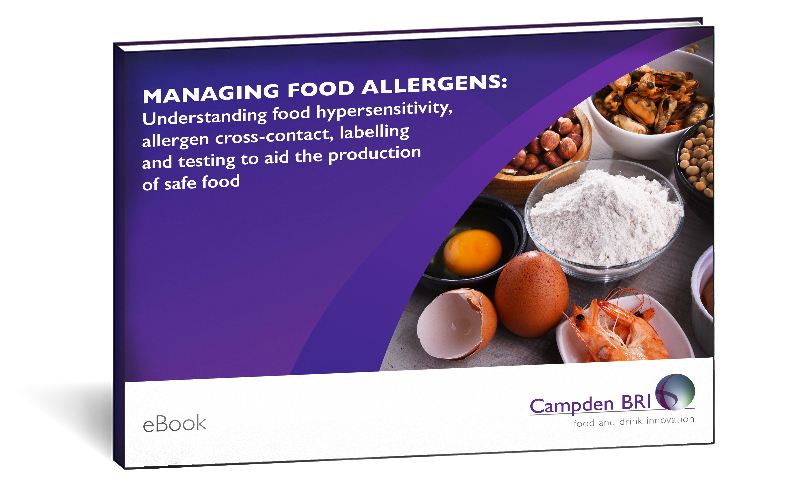
Food allergen management: what you need to know about the Codex code of practice
24 August 2023 | Christopher James, Food Safety Specialist - Allergens and Helen Arrowsmith, Regulatory Affairs Manager and Allergen Specialist
Roughly 3% to 10% of adults and 8% of children worldwide are estimated to have a food allergy. Cases of food-induced anaphylaxis, at times resulting in fatalities, highlight the importance of allergen management in the food and drink industry – making this not only a current hot topic, but also one that the sector will continue to deal with long term.
Codex Alimentarius Commission (Codex) shone light in this area following publication of its code of practice (COP) in 2020. Our food safety and regulatory allergen specialists aim to support your understanding of the COP through this blog, by breaking down the key parts that can assist with your food allergen management.
Download our FREE Managing Food Allergens eBook today! Secure food safety, control and confidence through effective allergen management

Codex on food allergen management for food business operators
Codex, a collaboration between the Food and Agriculture Organization of the United Nations (FAO) and the World Health Organization (WHO), is the global organisation that provides international food standards, guidance and codes of practice. This is to help ensure that food is safe and can be traded around the globe. Codex have provided a specific Code of Practice on Food Allergen Management for Food Business Operators, as well as supporting this key guidance with changes in the most recent revision to the Codex General Principles of Food Hygiene (amended in 2022).
Food allergens
Allergic reactions to food are the result of an adverse immune response to proteins within foods. The Codex COP tells us that consumption of food allergens should be identified as a significant food safety hazard for individuals with food allergy. Whilst many different foods can cause allergic reactions, globally there are eight food product groups (including products derived from these), which cause the majority of allergic reactions, these are:
- cereals containing gluten
- peanuts
- tree nuts
- milk
- eggs
- fish
- crustaceans
- and soybeans
Providing accurate information to consumers with food allergy is critical to ensuring their safety. Different jurisdictions have different rules concerning the obligatory and accurate provision of information concerning foods that are considered to be significant food allergens for their population. Other food allergens such as sesame, mustard, molluscs, celery, and lupin are recognised as important in many countries, including the UK and Europe (for full list in these jurisdictions: Food Information to Consumers Regulation (EU) No.1169/2011 Annex II).
Processing methods such as thermal or high-pressure processing, which are often used to control pathogenic microorganisms, or enzymatic and acid hydrolysis processing generally do not destroy allergenic proteins and therefore should not be relied upon to remove food allergens. Thus, the management of food allergens is crucial to prevent the presence or introduction of undeclared and/or unintended allergens in food products, which results in the hazard of inadvertent consumption of a food allergen by a sensitised individual.
Pushing proactivity in allergen management
The guidance provided by Codex to FBOs is to adopt a proactive and preventative approach to managing allergens in the food chain, rather than a reactive response once an allergen issue (such as unintended cross-contact of a food with an allergenic food) has occurred. This can be achieved through good hygiene practices (GHPs) or pre-requisite programs and, where appropriate, the implementation of HACCP systems.

The Codex COP states that food allergen management systems and their control measures should be based on risk assessment conducted by the FBO, in which they must identify the allergenic nature of the foods they handle and establish controls. This is to eliminate or minimise the potential for introduction of unintended food allergens through cross-contact, or for undeclared food allergens to be present due to errors in the supply chain. The provision of accurate food allergen information for consumers of foods sold loose (for example in food service) and on labelling of prepacked foods is also emphasised as an objective of the food allergen management plan.
Guidance and examples of good practice allergen management are provided in areas such as:
- primary production
- design and facilities
- maintenance and sanitation
- personal hygiene
- transportation
- product information
- and training.
The largest section of the COP relates to control of operation, which covers aspects such as control of food hazards, incoming material requirements, management and supervision, documentation and records, and recall procedures. Advice relevant to manufacturing, retail and food service is provided separately in each section.
Whilst the Codex COP is guidance, it does provide global regulators and legislators with the principles upon which to lay down new legislation or amend existing laws. This has already been observed with the publication of Commission Regulation (EU) 2021/382. This legislation is an amendment to the general hygiene Regulation (EC) 852/2004 in the EU to introduce requirements for FBOs to manage food allergens. In addition, in the US the Food Allergy Safety, Treatment, Education, and Research Act of 2021 (FASTER Act) was passed and came into effect in January 2023 to add sesame to the list of major allergens.
Once developed, existing food allergen management practices should be periodically reviewed. The Codex COP provides guidance on a proactive approach for effectively managing allergens in all food businesses from farm to fork and can therefore be used to help improve existing plans and develop them where they are currently limited or even absent. Better pre-emptive management of food allergens and accurate food allergen labelling will not only help to prevent potential financial implications (for example, from product recall or withdrawal) and brand damage for food businesses but will also benefit consumers with food allergy (by reducing their risk and uncertainty) ultimately improving their quality of life.
Need help with allergen management?
Dealing with food allergens can be challenging – but our teams are here to help.
We offer a range of services to support your food allergen management needs, including; allergen training courses, testing, and practical support with cleaning validation, hygienic design, food safety management systems, and labelling and legislation.

About Christopher James
Chris joined the Global Safety and Quality team at Campden BRI in August 2019 after studying Nutrition at Coventry University graduating with a BSc (Hons). He is a Registered Associate Nutritionist (ANutr) and a Member of the Institute of Food Science and Technology (MIFST). Chris has undertaken multiple placements and an internship in various public health settings applying his knowledge of nutrition, food science and dietary conditions (including food hypersensitivity).
He brings this knowledge to his current role of Safety and Quality Specialist - Allergens working in collaboration with other specialists to achieve a holistic approach to food safety management. Chris provides training and consultancy in all areas of food safety management including allergen management, TACCP (food defence), VACCP (food fraud) and HACCP.
During his time at Campden BRI, Chris has contributed to writing guidance, articles, reports and research on current industry topics. He most recently collaborated with BRCGS in the development of guidance on Effective Allergen Management.
Chris is currently undertaking a PhD at the University of Nottingham with the subject ‘Current and emergent allergens in food production systems.’

About Helen Arrowsmith
After her PhD, Helen joined Campden BRI in 2004 when she spent a year as Technical Support Officer in the Food Composition Section. The next nine years were spent in the Biochemistry Section, where Helen managed the provision of technical contract services in the area of food allergen detection, provided interpretation of testing results, consultancy, information and advice on food allergen testing.
In 2014, Helen moved to our Regulatory team where she has gained comprehensive understanding and experience of food law, not just relating to food allergens.
Helen now uses her knowledge and expertise to provide advice on all aspects of UK and harmonised EU legislation, including relating to food allergens. Helen presents on scheduled and tailored training courses on food law and food allergens, and oversees the production of our Food Law Alert.
Helen has managed various research projects; in 2023 she supervised and contributed to a Review of the literature and guidance on food allergen cleaning for the Food Standards Agency . Helen has also co-authored two guidance documents for the food industry on ‘Validation of cleaning to remove food allergens’ (Campden BRI Guideline 59) and ‘Food allergens: practical risk analysis, testing and action levels’ (Campden BRI Guideline 71).
How can we help?
If you’d like support with food allergen management, contact our expert team to find out how we can help.
Managing Food Allergens eBook
Download our FREE Managing Food Allergens eBook today! Secure food safety, control and confidence through effective allergen management.






